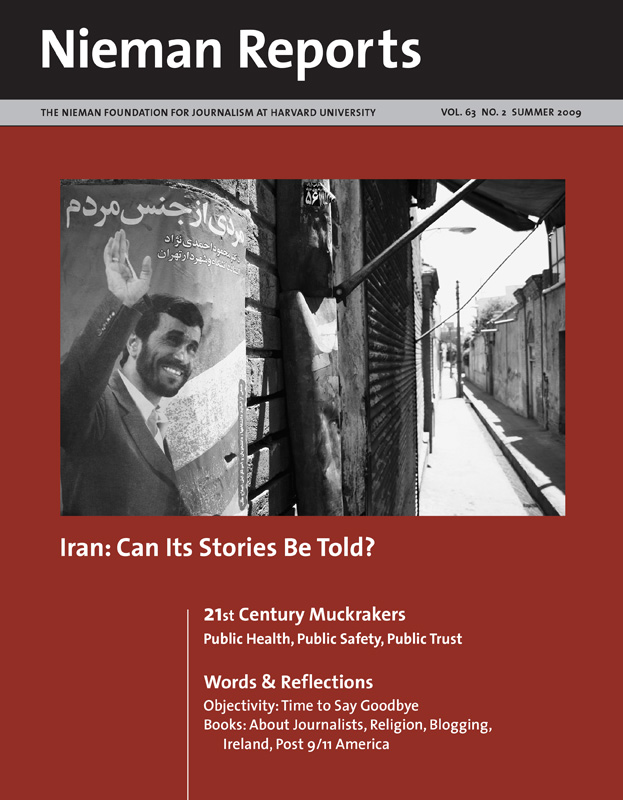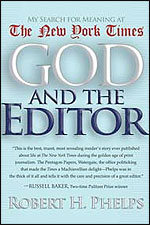Is journalism a religious calling? That’s the question raised in this engaging memoir by Robert Phelps. Tracing his journey from the shores of Lake Erie to the newsroom of The New York Times, Phelps describes a career that was nothing short of a spiritual quest.
With the publication of “God and the Editor,” Phelps joins a national conversation about the religious character of the journalistic profession. In works such as Mark Silk’s “Unsecular Media” and Doug Underwood’s “From Yahweh to Yahoo!,” scholars have uncovered the influence of religious values on American journalism. I found something similar in my book “People of Faith,” an exploration of the place of religious conviction in the careers of Cokie Roberts, E. J. Dionne, Jr., Peter Steinfels, Kenneth Woodward, and a dozen other prominent journalists. On more than one occasion, my respondents described their commitment to objectivity and fairness as an outgrowth of their Christian beliefs.
By calling The New York Times his “substitute for religion,” Phelps echoes a 2004 essay by journalism professor Jay Rosen on his blog, PressThink. There Rosen argued that “journalism is itself a religion,” complete with its own creed (written by Walter Williams of the University of Missouri), sacred scripture (the First Amendment), and high priesthood (the members of the Pulitzer Prize board). Following Bill Moyers, Rosen identified the Columbia Journalism Review as the “high church” of journalism. He could just as well have mentioned this publication. During his decade as the editor of Nieman Reports, Phelps served on the Pulitzer Jury for National Reporting, confirming his place in the hierarchy of American journalism.
Though Phelps retired at the top, he began near the bottom, at the Daily Citizen in Ambridge, Pennsylvania. Before and after World War II, he covered state politics for United Press in their Harrisburg bureau. Part of Tom Brokaw’s “Greatest Generation,” he served as a Navy correspondent in the Pacific theater, risking his life in the Battle of Okinawa. After a brief stint in public relations (which greatly troubled his conscience), he entered the holy of holies of American journalism, “the block-long newsroom of The New York Times on 43rd Street.”
Phelps is not the first writer to describe the search for meaning at The New York Times. John Cogley’s “A Canterbury Tale” includes a chapter on his years covering religion, as well as an account of his decision to leave Catholicism for the Episcopal Church. Recounting a 1985 sabbatical, Ari Goldman’s “The Search for God at Harvard” describes his struggle to reconcile the demands of Orthodox Judaism with the life of a reporter. Religion also appears several times in Gay Talese’s “The Kingdom and the Power,” a portrait of the Grey Lady during the postwar years. The chapter on evangelical John McCandlish Phillips is one of the highlights of the book, as is his account of editor A.M. Rosenthal “sitting shivah” after the assassination of Robert Kennedy.
A Spiritual Journey
At the outset of his book, Phelps notes that the reader will have to judge “whether my spiritual journey was authentic.” This appeal to personal authenticity is not surprising in a nation of religious individualists. Identifying as a spiritual seeker, he distances himself from the Protestant revivalism he encountered as a youth. By praising Thomas Jefferson, Mary Baker Eddy, William James, and the Quakers, Phelps locates himself in an authentically American tradition, joining the “restless souls” chronicled by historian Leigh Schmidt.
One mark of Phelps’s authenticity is his willingness to acknowledge his own shortcomings. In “A Canterbury Tale,” Cogley apologizes for leaving out “my own sins of mind and flesh,” trusting “that these have been absolved through God’s grace and have been consigned to oblivion.” Not having the luxury of a confessional, Phelps takes a different approach. In Chapter 2, “Sex, Pacifism, and the Cub Reporter,” Phelps catalogues his youthful indiscretions. Painting a sobering portrait of his early career, he admits using “the power of the press for personal advantage,” fabricating a quote, deceiving his readers, and accepting free liquor from a politician. This confession of sin continues into the middle chapters of the book, where Phelps acknowledges his early blunders at The New York Times, including the use of his position to obtain a cheap Mercedes. When the car failed to please, Phelps concluded that “the god of newspaper ethics was trying to teach me a lesson.”
Never does this detailed examination of conscience descend into what theologians call a morbid scrupulosity—the tendency to turn minor mistakes into grievous sins. What saves “God and the Editor” from self-flagellation is its didactic purpose: Phelps uses his own life to articulate a moral vision for the profession. In confessing his sins, Phelps professes his belief in the religion of journalism. He says as much in the book:
As I settled in on the National Desk, I gradually realized I had found the guide to my life I had been searching for. It certainly wasn’t religion in the classical sense; it was a secular substitute for religion. It was journalism as practiced at The New York Times.
In Part II of the book, we are treated to an insider’s view of the Church of EDITOR’S NOTE:
Between 1951 and 1978, “Winners & Sinners” was the name of the internal bulletin of the Times, edited by national desk copy chief Theodore M. Bernstein.the Grey Lady, including such righteous crusades as the publication of the Pentagon Papers. Far from a hagiography, Phelps describes both the “winners and sinners” in the organization. Among the winners were the mentors who initiated him into the religion of daily journalism, including copyeditor John Stephenson. Among the sinners were stars like Harrison E. Salisbury, who is described as a “flawed role model.” Phelps reserves special criticism for Executive Editor A.M. Rosenthal, the man who ultimately blocked his career. Recounting Rosenthal’s volcanic temper and authoritarian management style, he calls him an “Imperial Editor.” By contrast, Phelps remembers being a “Partnership Editor,” recalling a collaborative relationship with his reporters during his years in the Washington bureau of the Times.
Between 1974 and 1985, Phelps preached the gospel of good journalism at The Boston Globe. Criticizing his reporters for arguing with sources, taking sides in policy disputes, and showing favoritism to political candidates, he tried to bring “a good dose of discipline” to the paper. In the end, he was only partially successful in adding a measure of objectivity to the paper’s “enthusiasm for helping the weak and exposing the corrupt.” According to Phelps, there were many “nonbelievers in objectivity” in the newsroom.
After his retirement, Phelps himself began to question the religion of journalism. Ever thoughtful and introspective, he renewed his search for transcendence when his beloved wife, Betty, became ill, a search that intensified after her death in 2003. Reflecting on decades of marriage and work, Phelps observed that journalism left him “spiritually bankrupt, with an emptiness of heart.” About the same time, he experienced a series of mystical events, including a vision of Jesus in his backyard. Though he later discovered it was the result of a hall light, Phelps remains open to the possibility that something more was going on.
At the end of this refreshingly honest book, Phelps articulates a question that confronted the journalists I interviewed for “People of Faith”: “Cannot truth come through the spirit?” Like many Christian reporters, Phelps is unable to reconcile the empiricism of his profession with the reality of the supernatural. All he can do is to live in the tension. Such epistemological humility is commendable. American journalists would do well to learn from his example.
John Schmalzbauer is the Blanche Gorman Strong Chair in Protestant Studies at Missouri State University and author of “People of Faith: Religious Conviction in American Journalism and Higher Education.”



 God and the Editor: My Search for Meaning at The New York Times
God and the Editor: My Search for Meaning at The New York Times